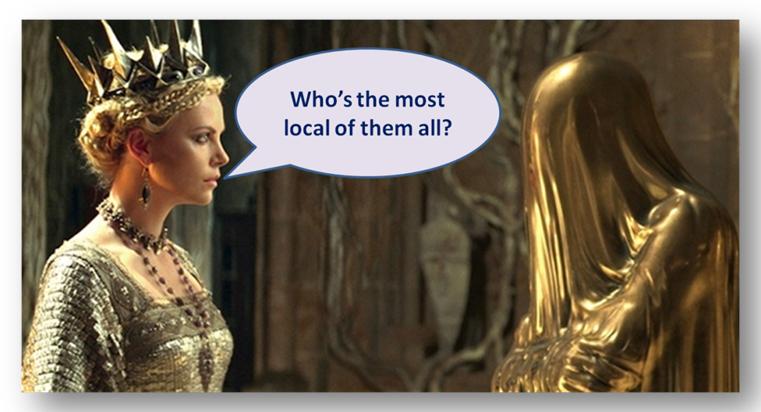Who’s the most local of them all? And does local even matter?
 That’s a good question as many in radio rapidly move to a more syndicated model, featuring national entertainment and information. The rationale, of course, is that great entertainment works whether it comes from your hometown, Hollywood, or New York City.
That’s a good question as many in radio rapidly move to a more syndicated model, featuring national entertainment and information. The rationale, of course, is that great entertainment works whether it comes from your hometown, Hollywood, or New York City.
And while that’s true, it’s also a fact that consumers are very interested in what’s going on in their own backyards and local environs. That was the bet that AOL made with Patch.
The idea behind Patch was to use the power of the web and thousands of local, free lance writers and bloggers to provide hyper-local coverage of community news and events. Overall, AOL’s investment in Patch has produced 863 community news sites – which generated operating losses of $147 million last year, while attracting only $13 million in advertising revenue.
One of the failures of Patch is being attributed to AOL’s inability to convince skeptical local advertisers to invest in these sites. On top of that national advertisers aren’t sold on these small community sites. So you add it up, and Patch has struck out on the ad front.
But that won’t stop Google from going for hometown dollars, despite false starts in the past. They are on the brink of climbing back into the local abyss as soon as next month. The Wall Street Journal reports they are going to launch a frontal assault, combining a variety of products, software, and platforms – all with the goal of winning over local merchants.
While their plan may have problems, the fact that more and more global companies (Pandora, Amazon, etc.) are targeting the local fitness studio, Thai restaurant, and heating/cooling contractor speaks volumes about the scope of this opportunity.
One of Google’s services is called TalkBin. It costs retailers $25 per month in exchange for instant customer feedback using smartphones. It is part of a digital menu of services designed to entice hometown businesses.
Google has encountered speed bumps in the past, partly because of the complexity of AdWords for local retailers. Now they’re hoping that new listings on Google+ can be a game-changer, as well as Punchd where shoppers earn points using those same smartphones.
Does any of this have any meaning or value for local radio stations?
 Well, Patch’s inability to make a go of it is probably complicated by a series of flaws and misjudgments. And whether Google is able to turn its past failures into local success remains to be seen. So here are some ideas designed to get a dialogue going as these big digital behemoths try to make a go on Main Street.
Well, Patch’s inability to make a go of it is probably complicated by a series of flaws and misjudgments. And whether Google is able to turn its past failures into local success remains to be seen. So here are some ideas designed to get a dialogue going as these big digital behemoths try to make a go on Main Street.
First, can an outside, global company truly hope to enter small and medium markets without the benefit of an existing cume or local audience? The success of sites owned and operated by radio companies has been bolstered by their ability to generate web traffic thanks to strong over the air brands.
Second, can these types of ad models – banners, in-stream ads, etc. – truly generate big revenue? Similarly, the smartphone platform is forward-thinking, but many retailers are still using flip phones, as are their customers.
Third, a local sales force with know-how is the essential part of the architecture. While broadcast radio has checkered results in this area, the fact is that local sellers with market experience and contacts are better able to navigate these waters. Should some of them be assigned to digital sales? Of course. It takes a combination of dedicated, knowledgeable local sellers using a mix of on-air, text, database, mobile, in-stream, and other tools that can provide integrated results. But despite their problems, they have better local contacts and a history in the market – attributes that Google and AOL lack.
At yesterday’s Convergence conference, this was a topic. Entrepreneur and Atari founder, Nolan Bushnell, agreed that the idea of bringing together traditional radio sales forces to partner with global companies made sense, especially given all the fits and starts that digital brands have experienced. What these big Silicon Valley names have with technological genius, they lack in good old down home street smarts.
So, nice try, AOL, and good luck, Google. But maybe we should leave the local game to… locals. For broadcast radio, this is still the critical pathway to long-term success.
- What To Do If Your Radio Station Goes Through A Midlife Crisis - April 25, 2025
- A 2020 Lesson?It Could All Be Gone In A Flash - April 24, 2025
- How AI Can Give Radio Personalities More…PERSONALITY - April 23, 2025




Leave a Reply